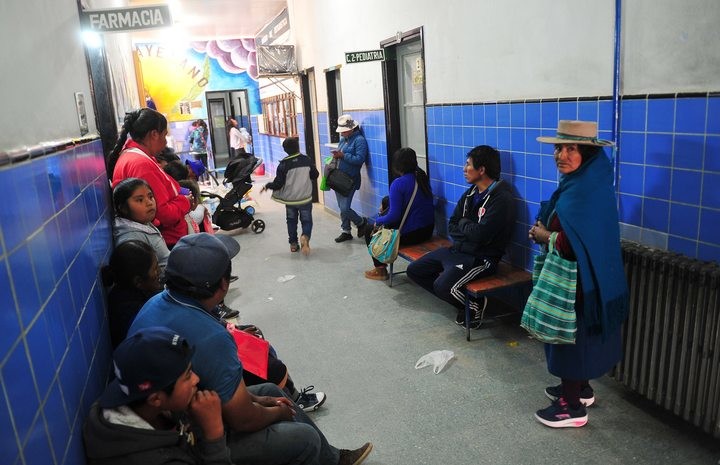
The UCR is becoming more and more libertarian along with the majority of legislators of the UXP block They expressly approved the Regulation of Law 6116 for the collection of health fees from foreigners in JujuyThe bill was introduced two days earlier, it was not approved by the parliament and it was not discussed in committee, it was approved in an express manner. Deputy Omar Gutierrez justified it this way because there was already a debate when the law was approved and it is settled.
It should be noted that during 2018 and 2019 there were national and international statements regarding the advancement of a Law that was going to leave a terrible precedent in the country.but above all it violates the National Constitution, Migration Law, and international treaties on the rights of migrants and human rights, which you can read here y here. As left-wing deputies, we were the only interbloc that opposed it from the beginning.and we denounce at that time and now, that Following speeches of xenophobia and racism, the privatization of the public health system was advanced, in accordance with the Strategic Health Plan, promoted by the anti-rights health minister, Gustavo Bouhid.
Data kills story
Among the Project arguments The Law states that, as it is a border province A large number of foreign people are received requesting health carehaving been provided with a quality and free service until now, to the detriment of nationals who often have to postpone their care due to the collapse of the system. But is it like that?
According to the 2019 Jujuy Ministry of Health Yearbookwas 49,175 hospital dischargesof which 121 were from other countries. And 0.28%. In it 2021was 42,965 hospital dischargesof which 469 were from other countries, 1.09%which coincides with national information on migrants, or from provinces such as Buenos Aires, the destination of a large number of them.
#Jujuy There are foreigners and foreigners.
I charge 70 thousand foreigners (poor Bolivians) for outpatient health care $500 M/year according to @JubertSantiago
0% Gross Income – 1 foreign multinational leaves Jujuy, the province lost $12.6 billion.
Health is a right.
— Natalia Morales (@NatuchaMorales) September 23, 2024
The incidence of health care for foreign migrants in Jujuy and in the country has no weight in the benefitshence its budget, according to official information beyond the construction of a xenophobic discourse, even with distorted data.
In fact, Health Minister Bouhidmentor of Law 6116, He stated in 2018 that women cross the border with Bolivia to give birth in Jujuy “They arrive in Jujuy with their child between their legs,” he said without blushing. The data he released to the media never appeared accurately in any official report, but other information was denied at the time.
He DIPEC report for the year 2022 noted in Jujuy, 29 live births from other countries, out of a total of 7,764, or 0.37%.
Bringing up recent data, The Minister of Health said in the Todo Jujuy Newspaper that “Between 2023 and the first half of 2024, 77,310 outpatient visits were made to foreigners, of which 71,517 were of Bolivian nationality.” These data, which cannot be corroborated by reports and are not on the Jujuy Ministry of Health portal, reflect the intention to make the responsibility for the serious situation of the public system in Jujuy over the brothers and sisters of Bolivia. The malicious data does not reflect how many people also have Argentine nationality, nor how many are temporary migrants. If they were true, they would reflect the social, family, and cultural relationship that the population of Jujuy has with Bolivia.
The campaign and construction of an imaginary against immigrants is to show that there are thousands of them, in order to then blame them for the health crisis, and not the governments that adjust and denigrate the health system. If we take into account outpatient care in the province as a whole, for 2021the Ministry of Health Yearbook reports 2,766,699 outpatient consultations (in hospitals, CAPS, Guardia, DIAT, and El Umbral), without the data being broken down by nationality. If the information provided by the minister were real, and if the total recorded for 2021 were maintained approximately, it would be only 2.78%.
Adjustment for those below, business for those above
The stigmatizing discourse of the UCR and UxP is a scapegoat faced with an increasingly precarious health system due to the adjustment policies approved in recent years by the two-party system in the Jujuy Legislature, but also in the National Congress and Senate.
In fact, it was doctors, nurses and those who support public health in the province who, at the beginning of 2024, denounced that there was an emergency in the health system due to lack of funding and poverty wages.
Far from Bolivian migrants being responsible, the Strategic Health Plan has been intensified for years, legitimizing public cuts and implementing public policies that place health as a commodity and a service that requires payment to access. In fact, laws were passed that open the bidding for hospital services, as well as the Recovery Law, and the plan for the implementation of a Provincial Health Insurance, which in other words, is the charge to access minimum services, which would already imply another discriminatory measure.
The Government of Jujuy and the PJ opposition thus legitimize that the adjustment in health is paid by the working people regardless of their origin or provenance.and reaffirms that they support the mandates of Milei and the IMF, without any question. Cuts in medicines, oncological treatments, long-term treatments, for people with disabilities, in prevention of sexually transmitted and reproductive diseases, are some examples of this attack on those below, which adds to the structural ones in the province, where private clinics abound and hospitals and health centers fall apart or do not have supplies, equipment and professionals.
Health Minister Bouhid should be held accountable for How much is the budget for public health adjustment in the province? What implications does it have? What budget is involved in caring for temporary foreign population? How much is collected by the health recovery system? How much is allocated to financing and business of private clinics?
It would not be out of place to say that officials and politicians from both parties are part of the business.
#Jujuy There are foreigners and foreigners.
I charge 70 thousand foreigners (poor Bolivians) for outpatient health care $500 M/year according to @JubertSantiago
0% Gross Income – 1 foreign multinational leaves Jujuy, the province lost $12.6 billion.
Health is a right.
— Natalia Morales (@NatuchaMorales) September 23, 2024
Reciprocity is not equal rights
Reports on migration in Argentina show that those who are transient or precarious are involved in working in conditions of slavery In the harvest, the so-called swallows, but also those who work in construction, textiles or domestic work. With this illegal law, these workers have the right to be exploited in the worst conditions but not to have universal access to health care.
For the rulers the problem is the poor, hard-working and indigenous foreigner Because when it comes to foreign multinationals, we see a different kind of deal with red carpets and privileges for those who plunder the province, despoil populations and destroy territories. How much does it cost, how much is it worth?
Recently the president of the Health Commission of the Jujuy Legislature, the doctor Omar Gutierrez, Together with the president of the Cambia Jujuy bloc (UCR and others) Santiago Jubert, they stated that the province will save 500 million pesos in one year if 70 thousand foreign migrants are charged for outpatient health care. (mostly from Bolivia) for 7 thousand pesos each consultation, according to the nomenclature of the Jujuy Insurance Institute.
They are crumbs torn from the most vulnerable sectors. The opposite of foreigners with crowns like the multinational Sales de JujuyArchadium Lithium, which has the legality to contribute 0% of gross income, which would imply 12.6 billion pesos lost by the province(calculated based on a profit of 360 million dollars), equivalent to one month of revenue from the Provincial Revenue Office. What would happen if the same goes to the health budget?
Health is a universal right. We have seen that one of the main arguments of the Government and the PJ is that there is no equal treatment in Bolivia, “there is no reciprocity” and there are no agreements signed between countries. What must be mentioned is that Public health systems vary from country to country, and are different, for example, if we take Argentina, Chile, Brazil or Bolivia. In the case of the ArgentinaAs a result of the achievements of the working people, we have a public system that guarantees health as a human right. A health system that has historically been built on the principles of universality and non-tariffing, and constitutional rights that put foreigners and Argentines on equal termsunlike other countries where access to health is private or semi-public for all without distinction of nationality, as is the case in Bolivia. Making the person, “citizen”, responsible for the state policies of other countriesIn this case, the health system, of which we are critical, is nothing more than a discriminatory act, and it will also affect those with fewer economic resources.
Migration Law No. 25,871 in Argentina is more progressive than in other countries and determines that the Argentine State has the obligation to provide access to health (Art. 8) and to absolutely guarantee the equality of these rights between nationals and foreigners, without any restrictions based on immigration status (Art. 6).
The laws that impose tariffs on an extremely vulnerable sector such as foreign migrants reinforce the policy of treating health as a commodity. It is reactionary and regressive, and therefore illegal in accordance with the National Constitution.
It is more than evident that, in times of economic crisiswhere a plan of plundering against the historical and recent conquests of the working people is put into play, promoted by an ultra-right government like that of Javier Milei and endorsed by the UCR, and even as we are seeing with this case, by the majority of the members of UxP, is that we are trying to move forward with rights such as access to health.
What is really hidden, then, in the tariff for the care of foreigners, is Reopen a debate on the right to health, established in our National Constitution and international human rights treatieswhich will be attempted to be changed by those who govern us and those who play their game, not without resistance and struggle.
An important fight against all the reactionary common sense that is being built against our Bolivian brothers and sisters and those of other nationalities in the defense of the right to health without any kind of discrimination and conditions in the country, and that it be of quality and with a budget, a defense that crosses borders. Also against the privatization of the public health system. A flag that has to be raised together with those who are fighting against layoffs, the privatization of companies such as Aerolíneas Argentinas, the attacks on indigenous communities, retirees, and various sectors of workers. It is clear that this cannot be done without unity and coordination in the streets, demanding that the trade unions, complicit in this situation, call for a strike and a plan of struggle incorporating these demands, against the austerity of governments at the service of the IMF.
Source: www.laizquierdadiario.com

